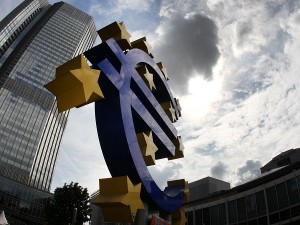ECB could be done helping eurozone economy

In this July 31, 2012 file photo the euro sculpture stands in front of the headquarters of the European Central Bank, ECB, in Frankfurt, Germany. The ECB announced Thursday, Nov. 8, 2012, that it has left its key interest rate unchanged at 0.75 percent despite sagging growth in the 17 countries that use the euro. The bank has already said that it has done enough and it’s up to governments to restore growth by cutting regulation and fixing their finances. AP/Michael Probst
FRANKFURT, Germany — The European Central Bank is unlikely to offer any further help for Europe’s sagging economy Thursday after already lowering interest rates to record lows and calming the region’s debt crisis with its plan to buy the bonds of heavily indebted governments.
After a year that has seen €1 trillion ($1.3 trillion) in emergency loans to banks, a rate cut, and President Mario Draghi’s vow to “do whatever it takes” to rescue the euro, some analysts say the ECB may consider itself finished with efforts to rescue the economy of the 17 European Union countries that use the euro.
Analysts say the bank will hold off cutting its key refinancing rate any further from its current 0.75 percent when the bank’s 22-member governing council gathers at its headquarters in Frankfurt. The council sets monetary policy for the eurozone and its 333 million people.
It is also unlikely that the ECB will offer any major new emergency measures, after Draghi made the risky but crucial step in September of saying the bank could buy unlimited amounts of government bonds and lower borrowing costs for those governments, such as Spain and Italy, that are struggling to finance their debts.
Eurozone financial markets have calmed since ECB made its offer, though it has yet to buy a single bond under it. The ECB would only do so if a country asks for the help and agrees to take steps to reduce its deficit. Even so, the bond offer and calmer markets have so far removed the threat of a government might be forced to default on its debts.
Article continues after this advertisementBut it will take more than that to get the wider economy moving again.
Article continues after this advertisementThe eurozone shrank 0.1 percent in the third quarter, and is likely to shrink again in the last three months of the year. Meanwhile, the ECB is expected to cut its forecast for next year from 0.5 percent to near zero, in line with the forecast for 0.1 percent growth from the EU’s executive commission.
Cutting rates can stimulate lagging growth by lowering borrowing costs, thereby making it easier for businesses to expand and consumers to spend. But bank officials have questioned how much good further cuts would do. Even with record low rates, businesses still aren’t borrowing much due to the weak outlook. Eurozone retail sales slumped 1.2 percent in October, far more than expected.
Low rates and an infusion of around €1 trillion in low-cost loans to banks last December and February are only now showing faint signs of trickling through to the wider economy.
The slack economy, along with lower oil prices, has helped lower inflation to 2.2 percent, closer to the bank’s goal of just under 2 percent. Yet even that won’t be enough to trigger a cut with rates this low.
Recent statements by Draghi and other council members indicate “that the ECB perceives its job, both on conventional and unconventional policy, as just about done,” said Marco Valli, chief eurozone economist at Unicredit. He sees no rate cut “for the foreseeable future.”
Christian Schulz, senior economist at Berenberg Bank, says that as long as the economy shows even a mild recovery by next spring, “the ECB will not cut interest rates further” and could even be the first major Western central bank to start raising them in late 2013.
Not everyone agrees. Analysts at Nomura and IHS Global Insight see a chance for a cut in the first part of next year and don’t completely rule out a surprise move Thursday. Howard Archer at IHS says low inflation and slack growth mean that the ECB “has ample justification and scope to take interest rates from 0.75 to 0.50 percent sooner rather than later.”
The ECB stance contrasts with that of the U.S. Federal Reserve, which is adding support for the US economy by carrying out open-ended purchases of government bonds until unemployment falls. The purchases keep longer-term interest rates down. The U.S. economy is growing, unlike Europe, but could face trouble from the so-called “fiscal cliff” — automatic spending cuts and tax increase that would result if Congress and President Obama fail to make a budget deal. The Fed next meets Dec. 11-12.